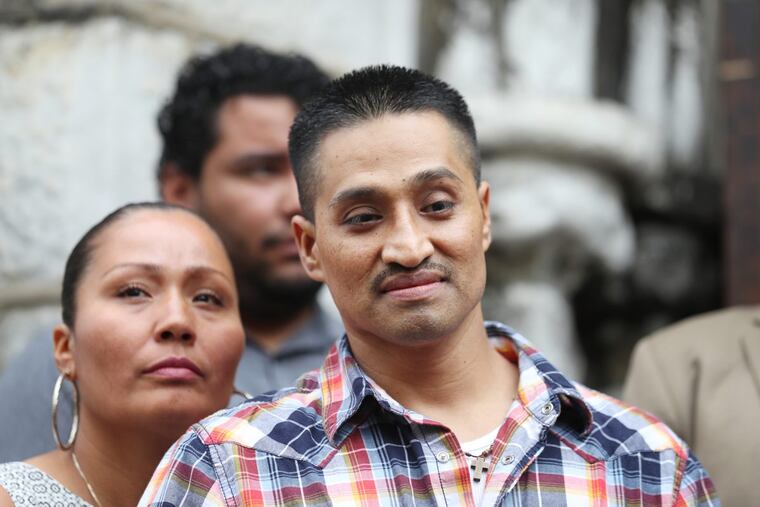After almost a year inside a church, undocumented immigrant leaves sanctuary
Now in line for a specific type of visa, Javier Flores Garcia left Arch Street Methodist Church without fear of putting himself in jeopardy.

An undocumented immigrant who spent almost a year living inside a Center City church to avoid deportation walked into the fresh air on Wednesday morning and into the arms of cheering friends and supporters.
Javier Flores Garcia, 40, of Mexico and Philadelphia, momentarily stood on the steps of Arch Street United Methodist Church shortly after 10 a.m., then took a first, tentative step onto the sidewalk, holding hands with his wife and children.
"Today I'm finally going to be able to go home to my family," he said in Spanish, addressing a half-dozen television cameras and about 20 photographers and news reporters. "This has been a difficult journey."
In sanctuary, he said, time seemed endless. He worked, painting virtually the entire church interior. Still, the days dragged.
"Every day is the same," he said. "You're in the same place. But you have to stay focused and remember my final goal, and that was to be with my family."
Garcia entered the church shortly after the November 2016 elections, fearing a fast removal to Mexico. That move stalled action by the federal Immigration and Customs Enforcement office.
Advocates said ICE agents could have entered the church to seize Garcia, but the agency generally has avoided entering places like churches and hospitals. And, they added, news photos of armed agents dragging a man from a church would not have been flattering to the federal government.
"Love wins today," the Rev. Robin Hynicka, the senior pastor, said Wednesday. He has grown close to Garcia and his family. "There is no 'status' on love."
He credited the women around Garcia, including his wife, Alma, and teenage daughter Adamaris, and Erika Almiron, executive director of the immigrant-advocacy group Juntos, with providing strength and leadership that ultimately propelled Garcia toward his first steps into an overcast fall morning.
Garcia's attorney, Brennan Gian-Grasso, said his client had been granted "deferred action,"allowing him to live and work in the United States while awaiting approval of what is called a U visa. It covers victims of crimes who have suffered serious mental or physical injury — Garcia was stabbed in a 2004 assault — and are willing to assist the government in prosecuting those responsible.
Garcia now is in line to receive that visa, his attorney said. In the interim, the deferred action designation means immigration authorities will take no action against him. Advocates say they expect Garcia to be able to stay in this country permanently.
On Wednesday, he said his first wish was to run and play with his children, then find a job to support his family.
Garcia first sneaked into the United States in 1997, coming to Philadelphia the same year. He had been deemed deportable because of prior removals; supporters said he had entered the country to reunite with his family.
Garcia subsequently spent 16 months in custody at both the York and Pike Counties detention centers. He was released from Pike County and given three months to get his affairs in order and prepare for deportation.
Instead, Garcia entered the church, his world shrinking to its size. He stayed in the church for about 11 months.
His backers say Garcia was among the first in the country to seek church sanctuary after Donald Trump was elected president. Since then, the president has fulfilled his campaign promise to get tough on immigrants, refugees, and other outsiders seeking to enter or stay in America.
Those views gain support from people who believe the U.S. has lost control of its borders, particularly in the Southwest, and that people who have entered the country illegally must be sent home.
On Wednesday morning, TV news trucks began lining up outside the church an hour before Garcia's scheduled departure. A homeless man asleep on the church steps stirred and fluffed his blanket. Inside the sanctuary, amid the red-carpeted floors and cushioned pews, friends waited nervously.
They shared hugs and handshakes and tears when Garcia stepped outside.
"It's completely overwhelming," said Almiron, of Juntos. "Resistance works. … This is a day to celebrate freedom."